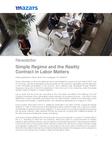
Simple Regime and the Reality Contract in Labor Matters
Some of the pillars on which the National Government based the issuance of Law 1943 of 2018 -Law of Financing-, was the simplification of the tax system for the economic reactivation and the decrease of the informality percentages in the Country. Such objective was developed through different measures, being one of them the substitution of the mono-tax for the unified tax under the simple taxation regime ("Simple" or "Simple Regime").
Let us recall that the mono-tax, according to the information provided by the National Tax and Customs Directorate (Dian), generated a gross collection for the period January - July 2018, of only $6'648,332, a figure calculated, according to the Tax Administration, based on the information of the official payment receipts in resident banks in the institutional databases as of August 31, 2018.
In this context, Article 903 of the E.T. (added by Article 66 of Law 1943 of 2018), creates the Simple Regime "in order to reduce formal and substantial burdens, boost formality and, in general, simplify and facilitate compliance with the tax obligation". In other words, it is a measure aimed at overcoming the low gross collection rates obtained through the single tax, bringing with it additional powers for the Dian aimed at combating tax evasion and abuse.
One of such powers added by the Financing Law is the one contained in numeral 3° of article 906 of the E.T., according to which the Tax Authority, without the need of a pronouncement of another judicial or administrative authority, may exclude from the Simple Regime the "natural persons resident in the country who in the exercise of their activities configure the elements of a labor contract or legal and regulatory relationship". Therefore, a natural person will not be able to benefit from this regime when the Dian determines that the contractual relationship between the taxpayer and his employer is not civil or commercial, but of a labor or legal and regulatory nature.
This rule is based on the fact that the Simple Regime, understood as an optional taxation model, is aimed at reducing the costs of business formality, being natural to exclude those who only have a labor or legal and regulatory relationship with their contractors. Therefore, the decision adopted by the Dian, in principle, will have exclusively tax effects that should not result in any liability for the contractor. However, such power deserves to be discussed since it transcends to the labor field taking into account that the Tax Administration must analyze the applicable regulations in development of the principle of primacy of labor reality, which is established in article 53 of the Political Constitution.
In accordance with the jurisprudence of the Constitutional Court and the Supreme Court of Justice Labor Cassation Chamber, as well as the provisions of article 24 of the Substantive Labor Code and paragraph 1 of article 2 of Law 50 of 1990, the judge, based on the constitutional principle of the primacy of reality over the formalities established by the subjects of the labor relations, shall be the one to examine the set of facts of the case, in accordance with the constitutional principle of the primacy of reality over the formalities established by the subjects of the labor relations, who will examine the set of facts of the case and finally determine whether or not the referred labor relationship is configured in order to adopt the measures concerning the labor consequences, or on the contrary, those derived from the mere rendering of independent services[1].
Consequently, concerns arise in this regard such as whether the determination adopted by the Tax Authority may have consequences for the Employer in the event that such pronouncement is taken into account by the Pension Management and Parafiscal Contributions Unit (UGPP) in its auditing processes, an entity that is also attached to the Ministry of Finance; or whether the granting of such power to the DIAN may be in violation of the principle of separation of powers (Art. 113 of the Political Charter), the principle of legal certainty and even the due process, understanding that the DIAN does not have the qualities related to the determination of the existence of labor relations.
[1] See Constitutional Court Decision C-665 of 1998.


